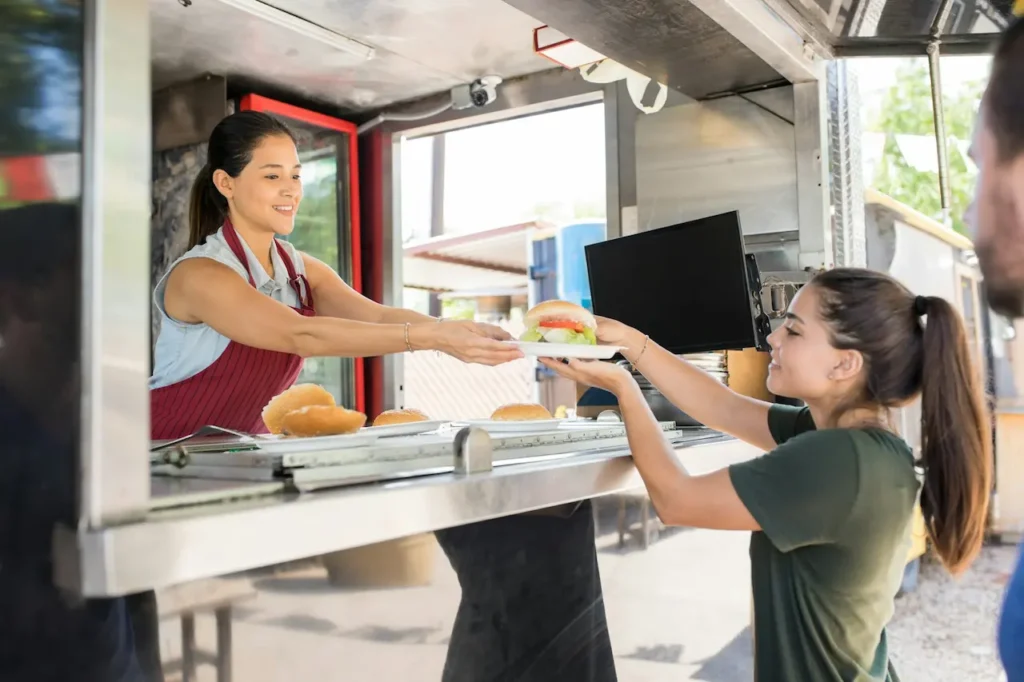A Guide to Grounding Your Restaurant-On-Wheels in A Firm Business Plan
Starting a food truck business is exhilarating — the open road, the creative menu possibilities and the potential to serve up some seriously delicious eats to your local community. But before you hit the gas and start taking orders, there’s one thing you cannot skip: crafting a solid business plan. It’s tempting to think that the flexibility of a restaurant-on-wheels gives you more leeway to wing it, but the truth is, just like any brick-and-mortar restaurant, a successful food truck relies on careful planning and smart financial decisions.
This guide is here to help you ground your food truck in a strong business foundation, ensuring you’re ready to tackle the hurdles and come out thriving. From crunching numbers with financial consultants to understanding the logistics of mobility, we’ll walk you through the key elements that should be a part of your plan. Let’s dive in.
Table of Contents
ToggleWork with a Financial Consultant: It’s Not Just About the Food
When you’re starting a food truck, it’s easy to focus on the fun stuff — like perfecting your menu, designing your truck and dreaming up quirky branding. But all those things will fall flat without a clear financial strategy behind them. So here’s our first point of advice — work with a financial consultant. It’s not enough to estimate what you’ll need for truck renovations, supplies and inventory. A financial expert will help you take a deeper look into costs you may not have considered, such as permits, fuel, ongoing maintenance and unexpected emergencies. They can help map out your profit margins and forecast potential challenges, ensuring you have a realistic view of the road ahead.
A good financial consultant doesn’t just crunch numbers — they help you strategise. Are you going to need a loan to get things rolling? What’s your break-even point, and how much revenue do you need to generate to stay afloat? These aren’t the easiest questions to answer, but they’re critical if you want your food truck to not only survive but thrive. By working with someone who understands the financial nuances of the restaurant industry, you’re giving yourself a strong head start, reducing the chances of hitting a roadblock early on.
Get to Know Your Target Market – Down to the Details
It’s one thing to say you want to serve the masses, but it’s another to know exactly who those masses are. Identifying your target market isn’t just about knowing that food lovers will line up at your truck. It’s about understanding their preferences, spending habits and even where they like to hang out. For example, if you’re targeting a younger crowd, serving Insta-worthy meals outside popular bars or cultural hotspots could work wonders. On the other hand, if your goal is to cater to families, you might want to focus more on setting up shop near parks or festivals.
Defining your target market helps shape everything from your menu pricing to your marketing efforts. Are you aiming to serve gourmet meals at premium prices, or is your food truck more about affordable, comfort food that appeals to students or the workday lunch crowd? Your target market should directly influence your decisions on how to market your brand, where to park and even what kind of customer service to provide. So get specific, and tailor every aspect of your business to the people you want to serve.

Understand the Legalities and Licensing: The Red Tape You Can’t Ignore
Let’s face it: no one gets into the food truck game for the paperwork. But ignoring the legal aspects of running a food truck can be a costly mistake. Before you even think about serving your first meal, you’ll need to make sure all your permits, licences and certifications are in order. This includes food safety certifications, health inspections and business licences — each of which might differ depending on where you’re operating.
Mobile food businesses often face more regulations than their stationary counterparts because of their mobility. You might need to comply with different rules in each city or region you operate in. And don’t forget about parking restrictions, zoning laws and limits on how long you can park in a particular location. It’s not just about getting your truck on the road – it’s about keeping it there legally. You can’t afford to cut corners on this front; doing so could shut you down before you even have the chance to build a loyal customer base.
Master Your Operations: Smooth Sailing Starts with Streamlined Systems
Winning customers takes more than whipping up delicious meals in a small kitchen — it’s about efficiency. Space is limited, so every square inch counts. You need to streamline your operations to make sure your service is fast, your staff aren’t tripping over one another and you can handle a rush without things falling apart. This starts with planning out your kitchen space wisely and investing in the right equipment — devices that fit without sacrificing the quality of your cooking process.
Operational systems go beyond just the kitchen layout. How will you take payments? In today’s cashless world, it’s essential to have reliable mobile payment systems that work smoothly, even in areas with patchy internet service. You’ll also need a clear strategy for inventory management — running out of key ingredients mid-service is a nightmare scenario that can tank your reputation fast. So, think logistics. Plan ahead, and keep your operations as smooth as your best sauce.
Develop a Killer Marketing Strategy: Social Media is Your Best Friend
Gone are the days when food trucks could rely solely on word of mouth. Today, if you want to make an impact, you need to be all over social media. Instagram, X, and Facebook should become your best friends. And we’re not just talking about snapping a photo of your latest dish — successful food trucks build entire online communities around their brand. Promoting your truck can involve showing behind-the-scenes content, engaging with your followers, announcing your locations and menu specials in advance and building a sense of excitement around what you’re offering.
But don’t just stop at social media. Think about how you can create loyalty in the real world too. Consider offering punch cards or loyalty programs, partnering with local businesses for events or hosting pop-up specials that create buzz and get people talking. The food truck industry is competitive, and the more you invest in building a strong brand and a loyal customer base, the better your chances of standing out from the crowd.
Plan for Growth: The Road Ahead
Just because your restaurant is on wheels doesn’t mean your business plan should stay stationary. From day one, think about how your food truck business can grow and evolve. Whether it’s expanding your menu, adding more trucks to your fleet or even transitioning into a permanent location, having a long-term vision is key. If you start with an adaptable plan, you’re better positioned to seize opportunities as they come.
A business plan that allows for growth means you’ll have the flexibility to respond to customer demand, market trends and even your own entrepreneurial aspirations. So while it’s crucial to nail down the details for launch day, always keep an eye on where you want to be in five years. By grounding your business with a solid plan, you’ll be well-prepared to scale new heights, wherever the road may take you!
Wrapping Up
Starting a food truck might feel like the ultimate adventure, but even adventures need a roadmap. With a comprehensive business plan, you’re not only preparing for the daily grind but setting your food truck up for long-term success.
So, get your finances in order, know your market, streamline your operations and market like a pro — then watch your mobile kitchen dreams roll into reality.
